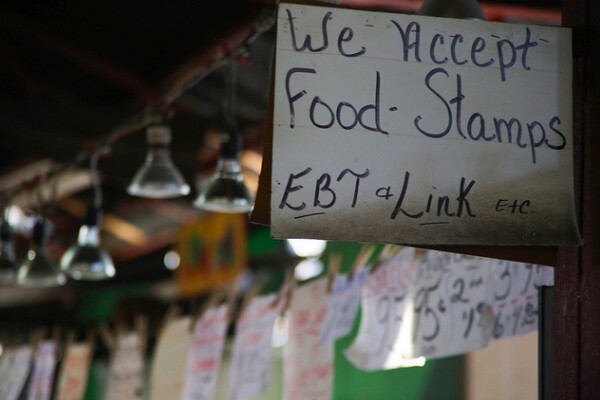Food Stamps Shut Off Over the Weekend

Within every cluster of friends, there are certain points of reference that act as a unique shorthand for that specific group, inside jokes that mean nothing to everyone else. Sometimes, it's a callback to a shared event. Other times, it's a small three-piece grunge band you and your pals saw in an empty bar one Thursday night. For my group of chums in high school, one recurring reference that constantly popped up in our conversation was the highly mediocre 1996 movie "The Trigger Effect."
While I'm still not entirely sure how this barely-known thriller became so enmeshed in our group -- the two most likely possibilities: (1) It was then being aired around-the-clock on the new Starz! cable channel and; (2) Elisabeth Shue, who we all had a collective crush on, had a starring role -- the movie was constantly brought up whenever something would go wrong with any form of electronics. If a phone stopped working? "You got a 'Trigger Effect' happening there." If a computer went on a fritz? "Watch out for the 'Trigger Effect." If the lights went out? Well, you get the idea.
The movie looks at the goings-on of a seemingly tight-knit suburban community after the power goes out. (Spoiler: Things don't go very well.) Looking back at the movie, what's perhaps most intriguing is that, even back then in 1996, people were worried about what would happen if a large-scale, long-term blackout ever happened. Now, 17 years later, when nearly every aspect of our lives is somehow controlled, manipulated and streamlined through a piece of equipment that will stop working if someone accidentally stumbles over a power cord ... things would be a whole lot worse.
And this weekend we got ourselves a little taste of just what could happen if our electronics stop working: People could starve.
On Saturday, people in 17 states who use EBT cards -- think debit cards for food stamp users -- to make their purchases at grocery stores couldn't do so after a computer glitch halted the system. Every story about the outage included mention of carts full of groceries left behind in store aisles because of the systemic failure. Which meant that people went to the grocery store looking for food, and went home hungry.
Luckily for all of us, the system has since been restored.
And no, despite what everyone figured when the system went down, the glitch wasn't due to the government shutdown currently taking place. Instead, it was traced back to Xerox Corporation, the company that handles the EBT program for the 17 affected states. Evidently, the company was performing a "routine test" on Saturday morning, before it became something a bit more serious. (And, really, if we've learned nothing else from movies, it's that when someone utters the phrase "routine test," you know things are about to go haywire.) Between this mess and the Obamacare webpage outages on October 1, the government might want to think about throwing some dollars in Silicon Valley's direction in an effort to pry some tech-savvy youngsters away to work in Washington. As it is, the fed's tech sector leaves much to be desired in terms of quality.
Now, there's a few lessons in this news for all of us. First and foremost, never sleep on a movie with Elisabeth Shue in the lead role. Secondly, oh I don't know, maybe if you're a huge corporation in charge of whether or not millions of people have access to food, save the "routine maintenance tests" for some overnight hour when less people are shopping? As one shopper in Maine succinctly put it:
"There's a lot of families who are not going to be able to feed children because the system is being maintenanced," Colman said. "No one should put maintenance in during the daytime."
But for the rest of us, there's a grander lesson to be had.
California wasn't one of the affected states. This time. The fact that we were left unscathed was mostly a matter of luck of the draw (in this case, California EBT not being under the control of Xerox) than anything else. So, then: Best use this real-life case to build your own theoretical bank of what you'd do if, suddenly, the lights went out? How prepared would you be? How long could you last?